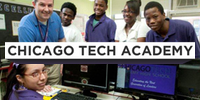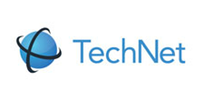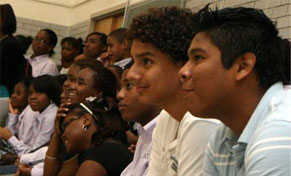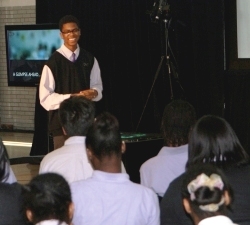




-
Recent Posts
Nice write up by Christina DesMarais in Inc Magazine about Chicago Tech Academy:
If you think the next generation of start-up founders will hail from Stanford, Harvard, or some other university cranking out MBAs, you might want to expand your thinking. There’s a 3-year-old inner-city high school in Chicago—filled mostly with poor African American youth—grooming students who know how to think, act, and speak like entrepreneurs.
Tomorrow night we’ll find our fourth freshman class and help them start an adventure that connects then to a world of opportunity. This school is only possible because of the incredible support of mentors, teachers and so many that have played a role in helping the students imagine success.
I just returned from a visit to Chicago Tech Academy and my first visit with an assembly of the 150 new freshmen… and I am inspired! This third class of students seems to be the most inquisitive, the most engaged and the most eager bunch of students I’ve met at the new high school.
 The reputation of ChiTech after the first two years and a targeted recruiting effort to find great potential students attracted a motivated group of kids. They were eager to learn about internships and mentors and careers they might enjoy; they had many questions about entrepreneurship and where the ideas and confidence come from to start companies. These new students asked about programming languages and video game design, about field trips they might take to local tech companies and about the people they might meet. They asked about using technology if they became doctors or architects.
The reputation of ChiTech after the first two years and a targeted recruiting effort to find great potential students attracted a motivated group of kids. They were eager to learn about internships and mentors and careers they might enjoy; they had many questions about entrepreneurship and where the ideas and confidence come from to start companies. These new students asked about programming languages and video game design, about field trips they might take to local tech companies and about the people they might meet. They asked about using technology if they became doctors or architects.
I spoke to them about the power of voice to ideas. I talked about the voice of Bill Gates 30 years ago in defining the personal computer revolution; about the voices of engineers who pushed to interconnect computers in real-time, and of Andreessen and other college kids who designed the web browser not far from Chicago. I admired the voice of Steve Jobs as he introduced the iPad, and of Zuckerberg when he weaved a social network through hundreds of millions of people around the world.
We spoke with the students about the power of their own unique voice, and how it someday could be used to express ideas, explain solutions and inspire. We talked about the breakneck speed at which technology has given voice to a planet full of people, and how technology can flatten the world to bring people together, bound by common humanity instead of divided by differences. We talked about how now, like no time in history, they have an opportunity for their voice to be heard, and it may be because of experiences and lessons learned at Chicago Tech Academy.
This conversation about voice– to ideas, to inspiration, to expectations of themselves – begins a conversation that I hope will last through high school and beyond. I hope it will continue as the students meet mentors from Chicago’s tech community, as they grow and mature and begin to look beyond their current circumstance. It’s an innovative approach, to think of a ChiTech education as an extended conversation between disadvantaged students and an engaged community willing to share advantages… after three years, we’re seeing some very inspiring results… you can hear it in their voices.
We helped create the Chicago Tech Academy for selfish reasons: the number of high school students going to college to study science, technology, mathematics and engineering is desperately low. As employers and entrepreneurs in the tech industry, the 700 members of the Illinois Technology Association already have trouble filling skilled jobs today, and the looming gap in five years was critical.
“Waiting no more” to inspire Chicago’s future tech leaders from Chicago Tech on Vimeo.
Mayor Daley recognized the workforce need, and challenged us to create a public school that would match students with the right curriculum, teaching approach and connections to industry to inspire a new generation of technology leaders. We decided to search for students from some of the most challenging parts of the system: open enrollment, accepting motivated students from across the city, regardless of their prior academic performance. We found students for our first freshman class already at or above grade level in reading, math and science. We also found students who were many grade levels behind, and committed to teach both toward a path for success.
We just completed our third freshman lottery and more than 1,000 hopeful students waited to hear their name called. Word had spread that this new school was a place for kids to learn the basics, and so much more. ChiTech students learn from a curriculum that includes hands-on, relevant technology skills, infused with an entrepreneurial spirit. Right away, freshmen study computer science, programming and how technology can solve problems and create value in the world. They interact with mentors that teach them about building businesses and reinforce the importance of staying in school. They learn to set expectations of themselves, and grow from the expectations placed on them by hundreds of teachers and mentors from Chicago’s tech community.
The average age of people inside mission control during America’s first trip to the moon was 26 . Eight years before, when JFK challenged America to go to the moon, all of those engineers were in high school. Chicago’s competitiveness in the world depends on today’s high school students, and it is simply not sustainable to have over half drop out of school. All kids – not just the ones who made it onto selective enrollment tracks or lucky enough to come from families and communities that can help – deserve a positive view of their future.
Chicago Tech Academy’s story – just like the story of each of our students – is still being written. Not unlike startups in the tech world, this school is also just a startup. We’re not spending a bunch of new money, we’re just investing more of our time and creativity. We do know we’re making a difference: though kids commute up to three hours a day to and from school, our average daily attendance rate was 92% last year, about 10 or 12 points higher than the CPS average. Despite a heavy enrollment from at risk youth, we finished our first year with more than 75% of students on track to graduate, a key predictor of future success for freshmen.
Students took regular field trips to Microsoft, Google, NAVTEQ and many other Chicago area tech companies big and small. They interacted with dozens of mentors and guests at the school. They created web sites, studied video game design, produced videos and podcasts, learned programming skills and built computers. They wrote business plans for new ideas they developed as a team, and honed critical life skills like public speaking, analytical thinking and problem solving.
We recognize not every school can count on heavy involvement from industry leaders… even Microsoft CEO Steve Ballmer took time out to be a mentor at ChiTech last year. But in everything we do, we keep an eye toward how our efforts might become replicable and scale beyond the walls of our school. We’re humbled by the job before us, and the monumental need for others to get involved in the public school system to help make a difference. We understand success depends on engaged parents, passionate and serving teachers, a rigorous but interesting curriculum, the right school culture and lots of connections to the world and workforce these students will someday enter.
Very proud to support the work that Eric and team have done in launching Genesys Works internship program from the ITA’s Chicago offices. We just finished a full summer training at Chicago’s TechNexus for the first 40 high school students, and they are now being placed in internships at leading companies throughout Chicago.
“Support for Genesys Works is important to the overall development of a talent pipeline for our region, identifying and mentoring students at all levels to expose them to future careers in our community,” says Terry Howerton, Chairman of the ITA and member of the Genesys Works Board of Directors. The ITA has more than 700 member companies, and is helping to align Genesys Works with complementary local initiatives for academic and industry collaboration.
Rafael Alvarez is the founder and CEO of Genesys Works, and has done wonderful things with the program in Houston. His passion convinced me to help bring the concept to Chicago, and the team he assembled did a remarkable job identifying and training the first class of interns. The concept is simple… we take kids following their junior year and spend the summer coaching them on life skills, office etiquette and IT skills, then place them in internships at leading companies like Accenture. Most of these kids come from inner city schools and are being exposed to opportunity for the first time.
I recently discovered Khan’s treasure trove of lessons while searching for a good tutor plan for my family… Great stuff, and an inspired and selfless commitment to teaching. On-demand learning that breaks down the traditional walls of education is key to the future, and it’s great to see Khan getting some recognition. More, please.
money.cnn.com – The homemade tutorials of the one-man Khan Academy are sparking a revolution – and Bill Gates and John Doerr are paying close attention.
A nice article by Tanya Roscorla in Converge Magazine about the CAAT:
At an inner-city high school in Chicago, 130 freshmen show up for class every day. They come from different parts of the city, different education levels and different financial situations.
Some spend two minutes walking to school. Others spend seven hours commuting back and forth.
Some read at a fourth-grade level. Others read at a ninth-grade level.
Some come from wealthy families. The majority come from poor families.
But they all go to the same school.
Why?
They want to learn from technology leaders. They want to learn from teachers who care about them. They want to learn about stuff that really matters.
CAAT had over 97% attendance during our freshman year, far higher than the average Chicago Public School attendance. This despite the fact that most kids commute an average of 3 or 4 hours a day to get to school. These kids are motivated.
“We’re trying to help them think and develop an aptitude that is entrepreneurial, that embraces risk, that embraces the out-of-the box thinking, that is rich in analytical thinking, that is rich in communications,” Howerton said. “These are skills that are necessary to be successful technology entrepreneurs, to be people who can literally change the industry, not skills or aptitudes that are necessary to just go be workers in some industry.”

When I was in the second grade, I found that it took our school a week or more to replenish the pencil vending machine by the principal’s office. You could buy pencils, two for $0.25, that had baseball or football teams, or your favorite TV show, as decoration along the outside of the pencil. But when you dropped in your quarter, it was completely random what pencils the machine would vend.
So I scraped together all the quarters I could find, and bought out the vending machine, cornering the market on pencils in our elementary school. The pencils that I bought, two for $0.25, could easily be resold for $0.25 each, doubling my money. And I could charge a premium on the pencils with the popular sports teams or TV shows, creating market demand. For weeks I carried a huge bundle of pencils in a rubber band, and became the street dealer for lead.
The school principal could have easily challenged my little business just by restocking the vending machine more quickly, but the value-add of being able to buy specific pencils would have remained. Thirty years later, I can still remember the principal calling my Mom into the office and complaining about my little enterprise… I’m grateful to this day that my Mom celebrated my entrepreneurial zeal as a seven year old.
I can relate to nearly every part of Cameron Herold’s TedX speech… I’ve spent my entire life unemployable, and probably diagnosable with most of the same disorders (ADHD, a little bipolar, etc) as most other would-be-entrepreneurs who are being dosed with Ritalin today.
Entrepreneurship isn’t just about making money, it’s about creating the solutions to solve problems and meet a need, and being unafraid of risk and failure.
The greatness of America is its entrepreneurial spirit, which has been a unique part of this country’s history since before it was founded. Taking risks, striking out on a rarely traveled path, creating value to change the the world, pursuit of a better life… these are the things to celebrate and nurture in kids, no matter how small those ambitions may seem at the time.
Students from the freshman class, who will enjoy mentoring relationships with tech leaders throughout Chicago during their four years of high school at CAAT, got a chance for some mentorship from Microsoft CEO Steve Ballmer.